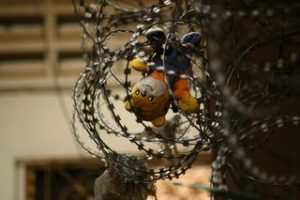
The United States has the highest imprisonment rate in the world. Although the rates of incarceration have essentially leveled off since around 2002, the United States lead the world in imprisonment: 2.2 million people were incarcerated in 2015. This mass incarceration is a affects prisoners, their children, and their relatives and loved ones. In fact, at least 2.7 million children in the U.S. have an incarcerated parent.
New research by Kristin Turney and Yader R. Lanuza explores the consequences of parental incarceration on children and their transition to adulthood. What makes this research unique is that it considers the relationship between parental incarceration and the issue of “launching” or “transitioning” into adulthood. Transition to adulthood, only conceptualized as a life stage in recent years, has been a focus for thinking about how to get stable adults in the workforce and in the habit of building families. Prior research has made it clear that incarceration reduces family income—during incarceration as well as after it. There’s instant and lasting collateral damage: It disrupts parental relationships and damages the mental health of both the children and romantic partners. How can we reduce inequality? This research helps to focus on entrenched social processes of inequality that mass incarceration yields.
Their study uses data from the National Longitudinal Study of Adolescent to Adult Health to investigate the relationship between parental incarceration and the transition to adulthood, collected in four waves between 1994 and 2008. Turney and Lanuza identified 10,937 respondents who had a parent who had been incarcerated at any time between age 0 to 17. They were able to compare these youth to others who had not had that experience.
Thanks to the rich data set, they were able to look at seven indicators of adulthood for the affected youth.
- The respondent feels older than others his or her age (compared to feeling younger and feeling neither older nor younger).
- The respondent feels like an adult all of the time (compared to most of the time, sometimes, seldom, never
- The respondent has his/her own residence (and does not live with parents, in another person’s home, etc.)
- The respondent is not enrolled in school
- The respondent is employed full time (working at least 35 hours per week)
- The respondent has ever been married
- The respondent has at least one child (measured by affirmative responses that the respondent ever had a live birth, for women, or that the respondent’s partner ever had a live birth in the context of their relationship, for men.)
The differentiations were intriguing. Children whose dads had gone to prison were different from others in the feeling questions—like feeling older—and the behavioral ones. In essence, they were systematically quicker to transition to adulthood. Specifically, respondents who experienced paternal incarceration were more likely to report feeling like an adult all of the time, to have lived on their own, to not be in school, to have married, and to have had a child.
As for moms who went to prison, respondents who experienced maternal incarceration were also more likely to report feeling like an adult all of the time; more likely to not be in school; and more often had a child. The point: The many markers of transition to adulthood were more common among children whose parents had been incarcerated. They had to grow up faster—and without supports or a safety net that might assist in education, full time work, or pacing family life.
Parental incarceration accelerates the pathways to adulthood, and adds significant stressors to that already difficult transition. These youth have parents who have enormous disadvantages in the job market when they get out of prison, which follows their loss of income while they are in prison.
High imprisonment rates in the United States are not just alarming to note for the individual placed behind bars, but for the transformative and significant consequences it has on their children.
Tasia Clemons is a Senior sociology major at Framingham State University, an Administrative Resident Assistant, and a CCF Public Affairs Intern.

Comments 2
Kenneth Braswell — October 28, 2017
can we post this on our blog?